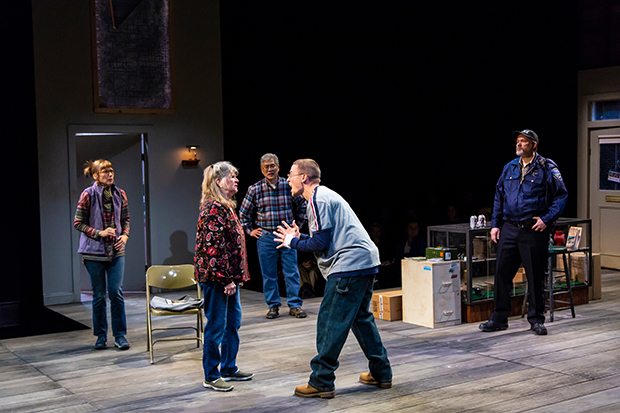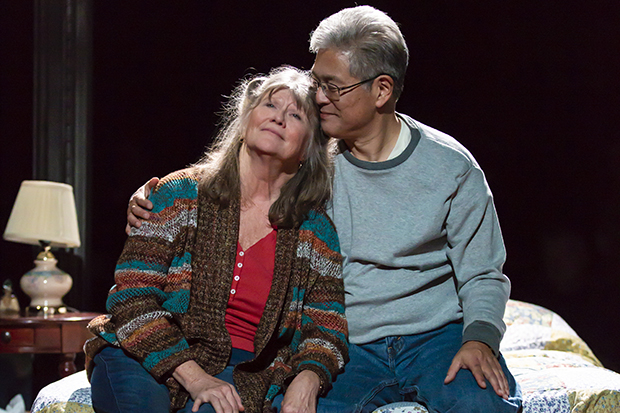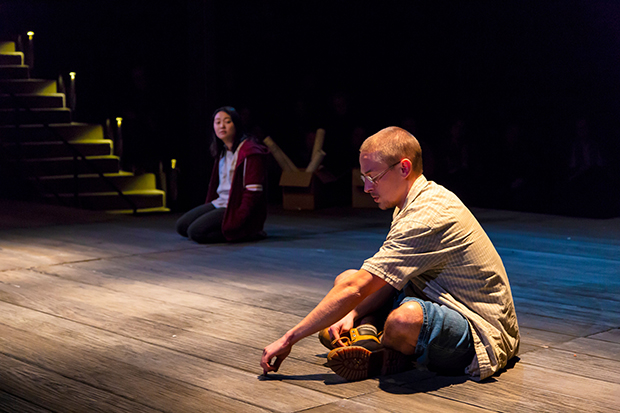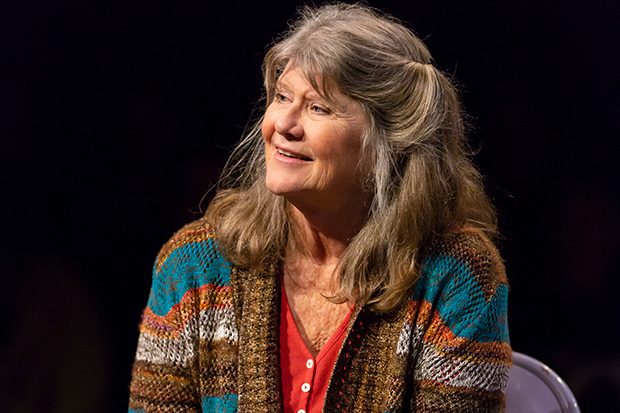An American Town Dissolves and a Family Struggles to Remain Solid in Greater Clements
Judith Ivey and Edmund Donovan star in Samuel D. Hunter’s latest drama.

(© T. Charles Erickson)
The elite response to heartland decay has become as hollow as a depleted mine: As factories automate, policy makers suggest that displaced workers learn to code. As coal towns wither, the remaining residents are asked, "Why don't you just move?" But it's never that simple, and the people making those suggestions know it. Could it be that they don't really care what happens to the lives disrupted by economic transformation, but want to appear as though they do?
For the last decade, playwright Samuel D. Hunter has been making it very difficult to look away from our crisis of despair. The Idaho native has become the bard of the heartland dispossessed with plays like The Few (about a floundering trucker magazine) and Pocatello (about a struggling Italian chain restaurant). Edmund Donovan, who appeared last season as an overburdened Costco employee in Hunter's Clarkston, delivers another unforgettable performance in Greater Clements, Hunter's new play at Lincoln Center Theater about an Idaho mining town.
Donovan plays 27-year-old Joe Bunker, the youngest member of an old mining family. After the nearby Dodson mine ceased operations, Joe and his mom, Maggie (Judith Ivey), made a living by giving guided tours of the tunnels. But even their little museum will have to shutter now that the town of Clements has voted to unincorporate, drying up municipal funds to maintain the mineshaft. Maggie's friend Olivia (Nina Hellman) tries to reverse the decision.

(© T. Charles Erickson)
On the way to deliver his granddaughter (Haley Sakamoto) to mock legislature, Billy (Ken Narasaki) stops in Clements to visit Maggie. Romantically attached in high school, they married other people and led separate lives. But now that Billy's wife is dead and Maggie is divorced, both see the opportunity to rekindle an old romance. Billy wants Maggie to leave town and move in with him, but she doesn't think she can leave Joe. And she's really not sure Billy would be able to handle living with her son.
As Donovan reveals in a virtuosic performance, Joe is not all right. Slow to pick up on social cues and dogged by a disorder that causes him to see blurs where there should be faces, he has a troubled history that has attracted the wary eye of the sheriff (Andrew Garman skillfully plays both good cop and bad cop). Donovan's Joe is particularly heartbreaking because he knows there is something wrong with him, and that it hurts his mother, but he doesn't know how to fix himself. Even when he is completely still, we can sense him paddling to a shore he can never reach.
As Maggie, Ivey gives one of the most distressing performances of the year as a mother torn apart by competing forces of love, responsibility, hope, and hopelessness. Armed with a rough western sense of humor and the resourcefulness of a woman accustomed to taking care of everyone, she makes us believe that she can handle anything — and the universe tests that assumption.

(© T. Charles Erickson)
Under the sensitive direction of Davis McCallum, all of the performances throb with vitality. Despite the heavy subject, Hunter endows his script with ample humor, and McCallum never skimps on the comic beats, helping us to connect with these characters on multiple levels. It makes the world of the play feel real and tangible.
The design also deftly pulls us into Hunter's world: Dane Laffrey's split-level set places the audience all around the Bunker museum and home, with one very striking scenic effect bringing us down into the depths of the mine. Fitz Patton's jarring sound design helps to accomplish that effect, as does Yi Zhao's bold lighting: At several points, we become dependent on the illumination from the lamp embedded in Joe's helmet. The full effect of Kaye Voyce's costumes becomes apparent only in the final scene: While all of the characters wear jeans and inexpensive casual wear (Joe's garments are particularly ill-fitting), a final character (Kate MacCluggage) arrives in a chic white sweater and cute ski cap, looking like an alien from planet Nordstrom.

(© T. Charles Erickson)
Humming in the background of Greater Clements is the conflict between downwardly mobile longtime residents and wealthy vacationers (this is the very same conflict Jared Diamond highlights in neighboring Montana in his book Collapse, about how civilizations fail). The legacy of Japanese internment and the broken promise of the West also echo through this play, like voices trapped deep underground. Do we run to the rescue, or try to ignore the screams? Most distressingly, Greater Clements suggests that the American urge to do something might be completely useless, that the fate of towns like Clements is written in the stars — and that is a tragedy.








